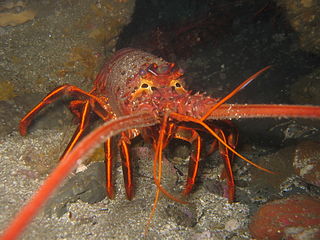Coitus interruptus, also known as withdrawal or the pull-out method, is a method of birth control in which a man, during sexual intercourse, withdraws his penis from a woman's vagina prior to orgasm and then directs his ejaculate (semen) away from the vagina in an effort to avoid insemination.

The Sacramento perch is an endangered sunfish native to the Sacramento–San Joaquin River Delta, Pajaro, and Salinas River areas in California, but widely introduced throughout the western United States.

The California spiny lobster is a species of spiny lobster found in the eastern Pacific Ocean from Monterey Bay, California to the Gulf of Tehuantepec, Mexico. It typically grows to a length of 30 cm (12 in) and is a reddish-brown color with stripes along the legs, and has a pair of enlarged antennae but no claws. The interrupted grooves across the tail are characteristic for the species.

Lobsters are widely fished around the world for their meat. They are often hard to catch in large numbers, but their large size can make them a profitable catch. Although the majority of the targeted species are tropical, the majority of the global catch is in temperate waters.

Uraeotyphlus interruptus, also known as the Chengalam caecilian, is a species of caecilian in the family Ichthyophiidae. It is endemic to the Western Ghats in southern India and is only known from its type locality, Chengalam village in Kerala.
The Kikambala nothobranch is a species of killifish in the family Nothobranchiidae. It is endemic to Kenya. Its natural habitats are swamps and temporary pools.
Scaphinotus interruptus is a species of ground beetle in the family Carabidae, in the suborder Adephaga . It is found in North America.

Psammodiini is a tribe of aphodiine dung beetles in the family Scarabaeidae. There are about 12 genera and at least 50 described species in Psammodiini.
Phloeonemus interruptus is a species of cylindrical bark beetle in the family Zopheridae. It is found in Central America and North America.
Phloeonemus is a genus of cylindrical bark beetles in the family Zopheridae. There are at least three described species in Phloeonemus.
Pycnoplectus is a genus of ant-loving beetles in the family Staphylinidae. There are about 11 described species in Pycnoplectus.
Aphoebantus interruptus is a species of bee flies in the family Bombyliidae.
Neopsammodius quinqueplicatus is a species of aphodiine dung beetle in the family Scarabaeidae. It is found in Central America and North America.
Neopsammodius is a genus of aphodiine dung beetles in the family Scarabaeidae. There are about nine described species in Neopsammodius.

Hypselonotus is a genus of leaf-footed bugs in the family Coreidae. There are about 12 described species in Hypselonotus.
Holocentropus is a genus of tube maker caddisflies in the family Polycentropodidae. There are more than 40 described species in Holocentropus.
Holocentropus interruptus is a species of tube maker caddisfly in the family Polycentropodidae. It is found in North America.
Ptinus interruptus is a species of spider beetle in the family Ptinidae. It is found in North America.
Smicronyx interruptus is a species of true weevil in the beetle family Curculionidae. It is found in North America.
Neopsammodius werneri is a species of aphodiine dung beetle in the family Scarabaeidae. It is found in Central America and North America.







